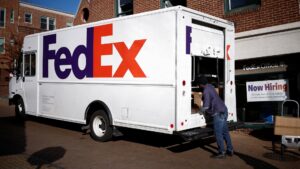Market Insights: Why Nike and FedEx Are Not Worth Your Investment Right Now
Welcome to the Extreme Investor Network, where we bring you timely and actionable insights to elevate your investment strategies. Today’s focus shines on two major players in the retail and logistics sectors: Nike and FedEx. With stock valuations showing potential for recovery, our analysis leads us to some unexpected conclusions about these companies and why they might not be the best picks for your portfolio.
The Current State of Nike and FedEx
Despite the pullback in stock prices—FedEx down over 18% and Nike down around 10% this year—experts suggest that both of these companies continue to face significant challenges. James Demmert, Chief Investment Officer of Main Street Research, recently shared his insights on CNBC’s “Power Lunch,” and his outlook is cautious. Reports indicate that FedEx has regrettably slashed its full-year forecast amid ongoing macroeconomic uncertainty, and Nike is contending with a decline in consumer sentiment, spurred by discussions around tariffs impacting a broad range of goods.
FedEx: A Troubling Trend
FedEx shares have recently hit a 52-week low and closed Friday down a steep 6.5%. Analysts might still maintain a "buy" or "strong buy" stance, citing an average price target of $310.72—a potential upside of over 34%. However, Demmert’s observations focus on a key concern: FedEx has repeatedly revised its profit outlook downward while missing revenue estimates three consecutive quarters. Even with a valuation of 14 times earnings, Demmert indicates that holding FedEx shares might not be a wise decision for investors seeking solid foundations.
Instead, Demmert champions companies like Parker-Hannifin and Hitachi. Why? Because of their diversified portfolios which buffer against market volatility—a critical factor in current economic conditions.
Nike: Competitive Struggles
Turning to Nike, Demmert expresses skepticism regarding its competition with trendier brands, particularly Hoka, and overall market position. With a 33% decline in shares over the last 12 months, Nike’s reliance on consumer sentiment as an economic bellwether appears precarious. Although Demmert acknowledges that the company is undergoing a turnaround, he warns that the fiscal fourth quarter has shown signs of deteriorating performance.
Even at a valuation of 13 times earnings, he believes Nike’s shortcomings, combined with looming tariffs, present too much risk for investors. For those looking for strong alternatives in the consumer discretionary sector, Demmert points towards Booking Holdings and Netflix—firms that have shown resilience in the face of shifting consumer behaviors.
Cleveland-Cliffs: Another Disappointment
In the materials sector, Demmert’s analysis extends to Cleveland-Cliffs. He describes the company as a “disastrous stock,” shaken by declining sales and lackluster results. While its year-to-date performance may appear stable, a 13% drop in March alone raises red flags. Caution arises from tariff implications even as Cleveland-Cliffs is a U.S. producer. Demmert favors industrial gas company Linde, highlighting a shift towards international investments as European valuations become increasingly attractive.
Conclusion
As the S&P 500 has managed to gain ground, preventing a fifth consecutive week of losses, there are important takeaways for investors at the Extreme Investor Network. The current economic landscape requires a nuanced understanding of how global tariffs, consumer sentiment, and market dynamics can influence stock performance. With Nike and FedEx facing headwinds, consider reallocating your investments in favor of diversified and resilient companies.
Stay tuned to the Extreme Investor Network for ongoing insights that empower your investment decisions and keep you ahead of the curve.
Follow us for more updates and deep dives into your favorite stocks. Your investment strategy deserves nothing less.

